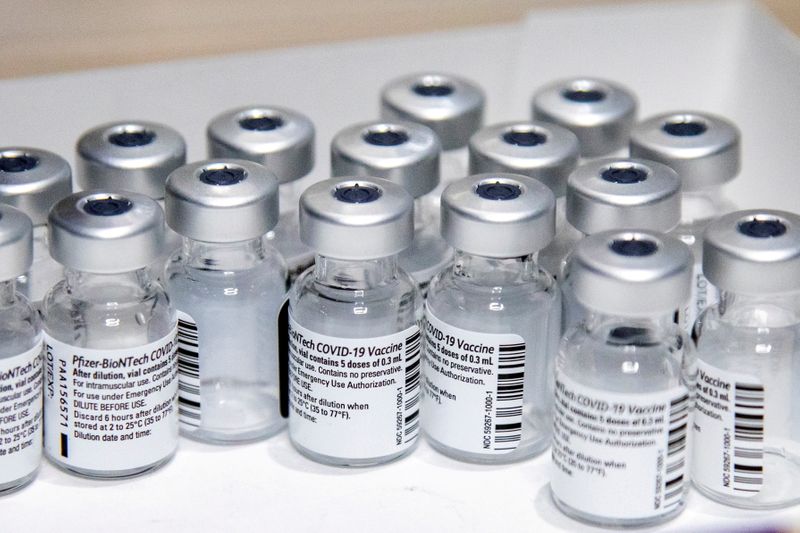By Ludwig Burger
FRANKFURT (Reuters) -BioNTech SE said on Monday that its order backlog for delivery of COVID-19 vaccines this year together with partner Pfizer Inc (NYSE:PFE) had grown to 1.8 billion doses, underscoring its role as a major global supplier of immunization shots.
That was up from 1.4 billion doses announced in March.
Based on these delivery contracts, the company said it expects about 12.4 billion euros ($15.1 billion) in revenue from the vaccine this year, including sales, milestone payments from partners and a share of gross profit in the partners’ territories, up from a previous forecast of 9.8 billion euros.
More than 450 million doses of the two-shot vaccine known as Comirnaty were supplied globally as of May 6, 2021. By contrast, AstraZeneca (NASDAQ:AZN), which has pledged to deliver up to 3 billion vaccine doses this year, said on April 30 it had supplied more than 300 million doses so far. That includes production from partners such as the Serum Institute of India.
BioNTech and Pfizer, which have been spared the type of production setbacks that have hobbled AstraZeneca and Johnson & Johnson (NYSE:JNJ) , have repeatedly lifted projected delivery volumes amid a global scramble to speed vaccination campaigns.
Earlier on Monday, BioNTech unveiled plans to set up a new factory in Singapore to produce several hundred million doses of its mRNA vaccines per year from 2023.
BioNTech's partner for China, Fosun Pharma , said on Sunday it would provide a factory with an annual capacity of up to 1 billion doses of the COVID-19 vaccine under a joint venture with BioNTech.
That followed a contract with the European Union for up to 1.8 billion doses of COVID-19 vaccines for 2021-2023, to cover booster shots, donations and reselling of doses.
BioNTech reported first-quarter total revenue of 2.05 billion euros, up from 27.7 million a year earlier, driven by vaccine sales, and including an estimated 1.75 billion euros from BioNTech’s share of gross profit from sales in Pfizer’s territories.
Quarterly net profit jumped to 1.13 billion euros, compared to a 53.4-million-euro loss in the year-earlier period.
The company said there was no evidence its current vaccine will need to be adapted to fight new virus variants, but added that it had developed strategies to address such variants should the need arise.
BioNTech reiterated that output capacity for the vaccine would reach 3 billion doses by the end of 2021, and more than 3 billion doses in 2022.

Pfizer last week said the pair was targeting production of as much as 4 billion doses of the shot next year, mostly for low- and middle-income countries.
($1 = 0.8222 euros)